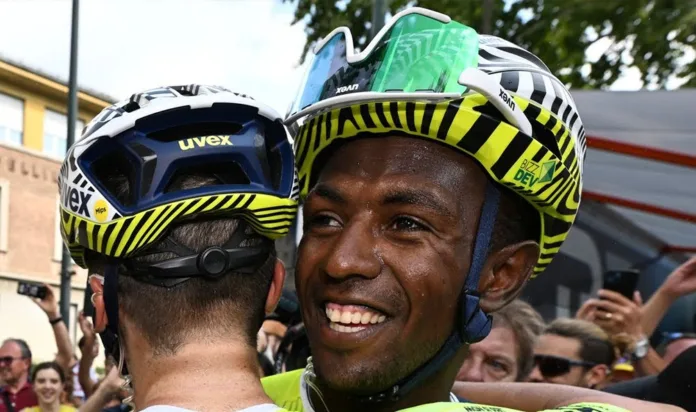Eritrean Sprinter Biniam Girmay celebrates three stage victories in the 2024 Tour de France, aiming to inspire greater diversity in cycling
Biniam Girmay, riding for Intermarché-Wanty, electrified the cycling world with his third stage victory in the 2024 Tour de France on Thursday, July 11. After crossing the finish line first at Villeneuve-sur-Lot, Girmay has solidified his status as a rising star, becoming the first Black African to win multiple stages in the prestigious race. His latest triumph adds to earlier victories on stages 3 and 8, putting him in a commanding position for the green jersey competition.
At just 24 years old, Girmay’s achievements have not only made headlines but also sparked conversations about diversity in a sport often viewed as Euro-centric. He acknowledged the significance of his victories, stating, “I’m the only Black rider in the [Tour de France] peloton, and that’s not nice, to be honest.” Girmay hopes his success will inspire more investments in African cycling, enabling future generations of cyclists to compete on the world stage.
The stage win at Villeneuve-sur-Lot was marked by a well-coordinated team effort. Girmay’s teammates executed a strategic plan that involved applying pressure early in the race to tire out rivals. As the race progressed, they positioned Girmay perfectly for a final sprint. Teammate Mike Teunissen played a crucial role in leading Girmay into the last kilometre, setting him up for a powerful finish. “They did a super-good job throughout,” Girmay praised, highlighting the importance of teamwork in achieving victory.
Despite the immense pressure following his groundbreaking win in Turin, Girmay has remained focused and determined. He expressed his motivation for continuous improvement, stating, “I wake up and look in the mirror and say, ‘let’s do it again.’” This mentality has propelled him to success, with three stage wins already under his belt.
The reception to Girmay’s achievements has been overwhelming, flooding his phone with messages of congratulations. Yet, he remains grounded, emphasizing the need for a diverse cycling landscape. “If European teams invest more in African cycling, we can have a more global sport,” he asserted, reflecting on the potential for broader representation in cycling.
As Girmay continues to dominate in the Tour, his story represents not just personal success but a call to action for the cycling community to embrace diversity and support emerging talent from all backgrounds. With upcoming stages still ahead, fans eagerly anticipate what this remarkable athlete will achieve next.
Analysis:
Political:
Girmay’s success resonates in the context of global sports politics. As the only Black rider in the Tour de France, his presence challenges the status quo and highlights the lack of representation in a sport dominated by European athletes. This could prompt discussions among sports federations and sponsors about diversifying their support and investment strategies. As cycling organizations consider policies to promote inclusivity, Girmay’s visibility could serve as a catalyst for change.
Social:
Girmay’s victories offer a powerful narrative that resonates with societal debates about inclusivity and representation in sports. His journey from Eritrea to the world stage exemplifies the potential for talent to emerge from unexpected places, encouraging young athletes from diverse backgrounds to pursue their dreams. His role as a trailblazer can inspire community initiatives aimed at increasing access to cycling and sports programs in underrepresented areas, ultimately fostering a more inclusive sporting culture.
Racial:
Girmay’s position as the only Black African in the Tour de France highlights the racial disparities that exist within cycling. His success shines a light on the need for more Black athletes to be represented at high levels in the sport. By advocating for greater investment in African cycling, Girmay calls for a collective effort to break down barriers and create opportunities for athletes of all backgrounds. His visibility in a major international race challenges stereotypes and promotes a narrative of empowerment and inclusivity.
Gender:
While the focus of this event is on male cyclists, Girmay’s story indirectly supports discussions about gender equality in sports. The underrepresentation of women in cycling mirrors the racial disparities faced by Black athletes. Girmay’s advocacy for diversity can serve as a reminder of the importance of supporting female cyclists, as well. By fostering a culture that values representation across all demographics, the cycling community can work toward greater equality for both genders.
Economic:
Girmay’s success may also have economic implications for the sport, particularly in terms of sponsorship and investment. Increased visibility for African cyclists could attract new sponsors interested in supporting diverse talent. This, in turn, may lead to economic growth within African cycling communities, fostering local talent and contributing to the sport’s global appeal. Girmay’s achievements can catalyze a shift in how cycling is perceived and supported, encouraging investment in infrastructure and training programs that benefit future athletes.
